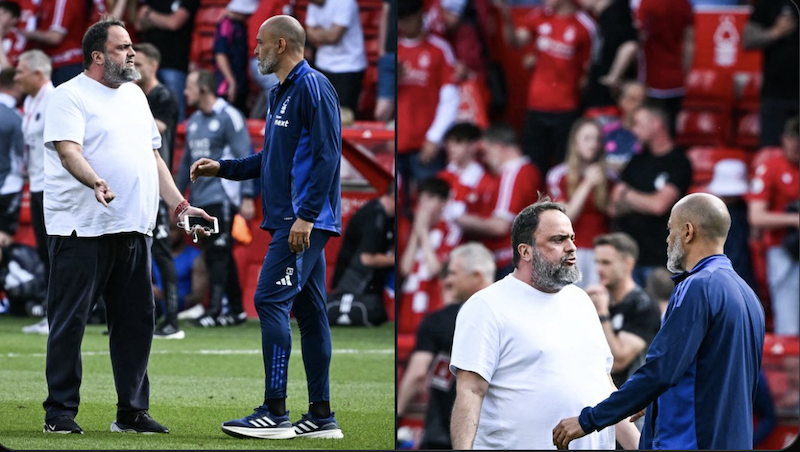The incident following Nottingham Forest’s 2-2 draw with Leicester City, which initially appeared to be a heated confrontation between club owner Evangelos Marinakis and manager Nuno Espirito Santo, has been clarified by the club. Forest asserts that Marinakis’ actions stemmed from deep concern for injured striker Taiwo Awoniyi, rather than any disagreement with Santo. Awoniyi suffered a serious abdominal injury after colliding with a post late in the game and, despite being cleared by medical staff, continued to play visibly hampered by pain. This sight prompted Marinakis’ emotional reaction and his entry onto the pitch.
Nottingham Forest emphasizes Marinakis’ profound emotional investment in the club and its players, describing the club as “family” to him. His reaction, they argue, was a spontaneous display of care and responsibility driven by witnessing Awoniyi’s distress. The club insists that Marinakis’ frustration was directed at the medical team’s decision to allow Awoniyi to continue playing, rather than at Santo or anyone else. They maintain that there was no confrontation, only shared concern for the player’s well-being among everyone present. The club statement portrays Marinakis as a deeply caring owner whose actions, though perhaps impulsive, were motivated by genuine concern for a player in pain.
The club’s statement strongly refutes the narrative of a conflict between owner and manager, emphasizing the shared concern over Awoniyi’s injury. They criticize the rush to judgment by pundits and online commentators, particularly former players and coaches, highlighting the importance of having full context before making public pronouncements. The club suggests that some critiques were driven by a desire for social media attention rather than a genuine understanding of the situation. They argue that such unfounded criticism is detrimental to all involved, especially the injured player.
Forest’s statement underscores the deep emotional connection Marinakis has with the club, painting a picture of a caring owner deeply invested in the well-being of his players. They frame the incident as a demonstration of his leadership and commitment, highlighting his willingness to step in when he perceives a player’s health to be at risk. The statement seeks to shift the narrative from one of conflict to one of shared concern and emphasizes the importance of responsible commentary based on factual information.
Furthermore, Nottingham Forest draws attention to the principle of player welfare, stating that it is a core value deeply held by Marinakis. They argue that his actions on the pitch, while perhaps unconventional, were a direct manifestation of this commitment to player safety. The club implies that Marinakis’ reaction should be viewed not as an overstepping of boundaries but as a demonstration of his unwavering dedication to protecting his players. This reinforces their portrayal of Marinakis as a caring and responsible owner, further distancing him from the initial accusations of confrontational behavior.
Finally, Nottingham Forest calls for greater caution and responsibility in public commentary, particularly in the fast-paced world of social media. They urge pundits and other public figures to refrain from making hasty judgments based on incomplete information. By highlighting the potential harm such pronouncements can cause, particularly to the injured player, the club appeals for a more measured and informed approach to sports commentary. They underscore the importance of seeking out the full context of a situation before drawing conclusions and making public statements, urging a shift away from sensationalism and towards responsible reporting. This appeal for measured discourse serves as a concluding note, emphasizing the club’s commitment to accuracy and player welfare above all else.


